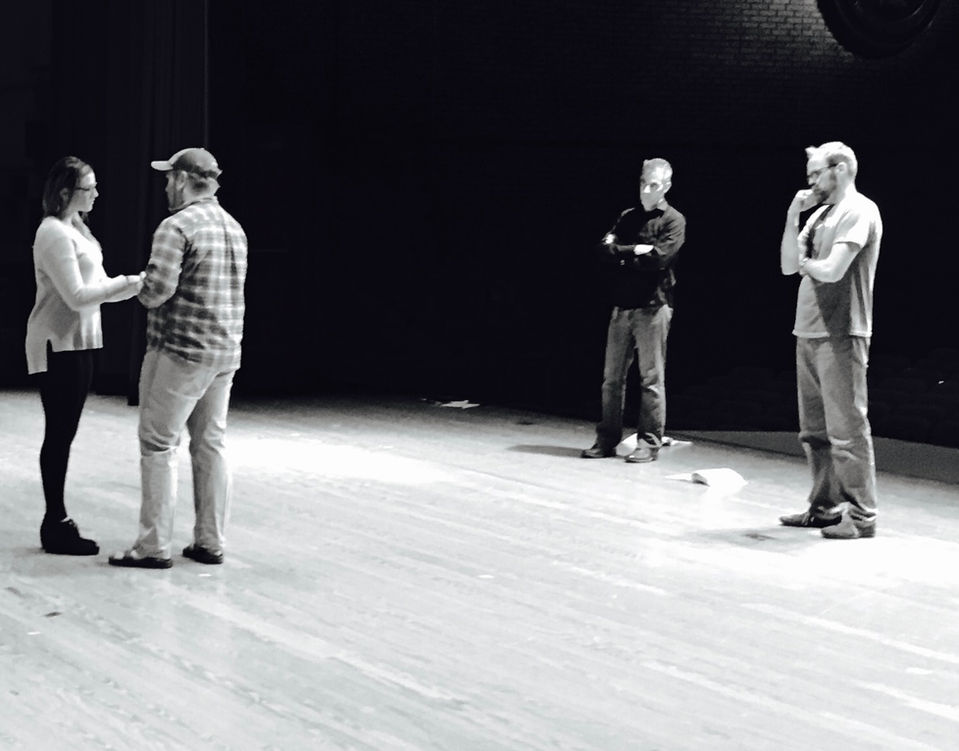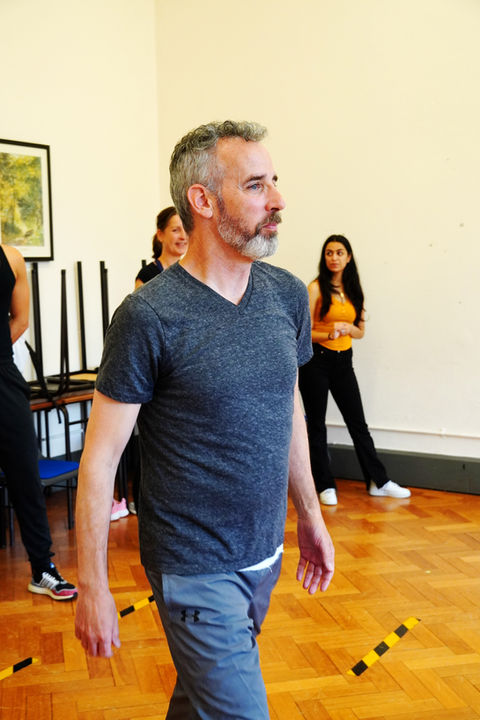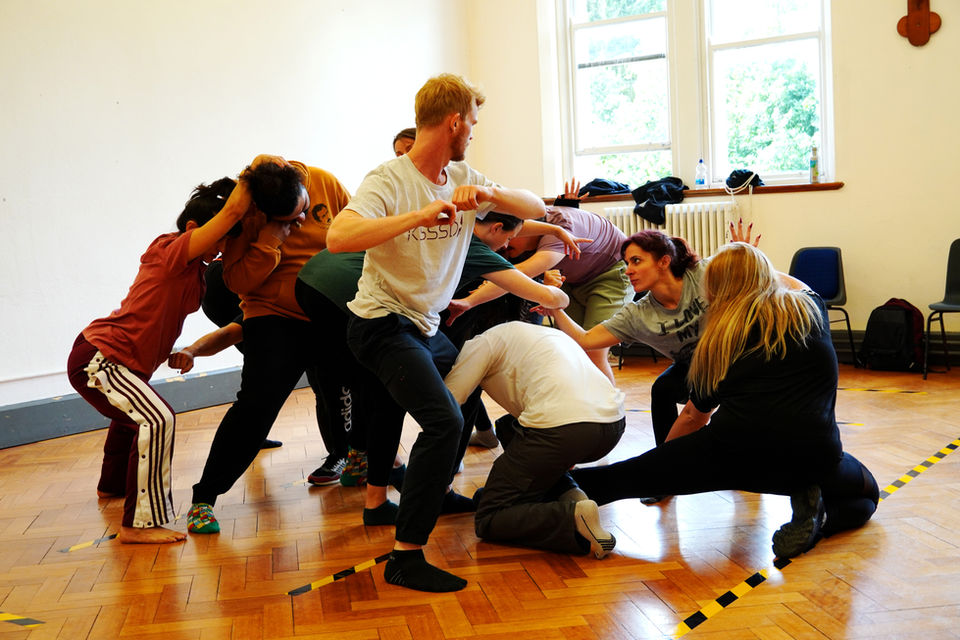Workshops, Master Classes, & Private Coaching
All the world's a stage...Let's create something.
Below is a menu of available workshop/performance programmes. The menu is divided between "Workshop" and "Full Performance" experiences and further organised by age groups.
"Workshop" programmes are intended to provide experiential learning opportunities and, while each programme has a small performance element, the focus is on developing theatre making skill sets and/or using drama techniques to enhance other curricula.
"Full Performance" programmes are designed to provide young artists the opportunity to develop and produce a full production for performance before an audience.
All of these programmes are built on an “accordion” model and can be presented in a variety of modalities from single sessions to multi-week programmes.
Whether you're looking for an experience that is 2 hours or 2 months in length - we can adapt a programme to suit your time frame.
If you don't see what you need here, let me know as I love creating "bespoke" programmes unique to your needs!
Please reach out with any questions or to discuss options and availability!
Workshop Programmes:
Ages 8-10:
Dramatic Journeys:
The focus in these sessions is on creative, imaginative play. During each class participants are introduced to a new children’s book or story. These are drawn from current literature or classic fairy tales/fables. After reading the story, students are led in creative play exercises that help them identify what makes up the core components of drama – the Three P’s (People, Places & Problems). The participants are encouraged to explore each of these elements and how they fit together through physical activity and re-playing or, in many instances re-imagining the story! A great way to encourage both reading and creative play at the same time!
Mask & Puppet
We explore story structure and character through the Three P’s (People, Places and Problems). Participants are instructed in various forms of simple Mask and Puppet creation. Then, using their creations in storytelling formats, they are given the opportunity to fully explore the creation of character.
Page to Stage
This workshop gives participants an opportunity to take a story from the page to performance. Establishing and working with the fundamental ideas of the Three P’s (People, Places and Problems) participants explore and bring a short story or fable fully to life as a small, ensemble based performance. This process encourages reading. The program builds critical thinking and collaboration skills as participants figure out the most effective way to lift the story from the page to performance using only themselves in order to communicate the story. From this the particpant begins to understand that performance engages the entire physical instrument.
Ages 11-15
An Introduction to Acting
This workshop introduces students to foundational techniques of the Actor's craft starting with the "Three C’s (Character, Circumstance and Conflict). Participants work to gain a strong grasp of these 3 basic components of dramatic structure. Through creative exercises, improvisational work and prepared, rehearsed scenes work, participants are introduced to rudimentary scene analysis technique, identifying character action, and the development of truthful, dynamic character creation and performance. Each session is highly individualized to meet each student "where they are".
Page to Stage
Geared specifically for early teens, this workshop gives participants an opportunity to take a story from the page to performance. Building on the principles of the Three C’s (Character, Circumstance & Conflict), this workshop also encourages collaboration and critical thinking skills as participants develop the most effective way to lift the story from the page to performance using only themselves in order to communicate the story - no elaborate sets, costumes or props. This approach also helps young actors understand that Acting engages the entire physical instrument.
Intermediate Acting
This workshop focuses more specifically on gaining an even deeper understanding and practical application of the core principles, techniques and tools of acting. Participants work with more advanced improvisational technique and scene work and are introduced to industry specific script analysis ideas and tools. Individual performative work is tailored so that each participant is challenged appropriate to their level of ability. Participants work with both contemporary and classic text (as appropriate). Other forms of performance (e.g. basic stage combat) may be introduced. Prior involvement in theatrical work/study is encouraged but not required.
Introduction to Improvisation
Introduction to Comedy Improv:
Basic Stage Combat
Ages 16 and Up
An Introduction to Acting
This workshop introduces students to foundational techniques of the Actor's craft starting with the "Three C’s (Character, Circumstance and Conflict). Participants work to gain a strong grasp of these 3 basic components of dramatic structure. Through creative exercises, improvisational work and prepared, rehearsed scenes work, participants are introduced to rudimentary scene analysis technique, identifying character action, and the development of truthful, dynamic character creation and performance. Each session is highly individualized to meet each student "where they are".
Intermediate Acting
This workshop focuses more specifically on gaining an even deeper understanding and practical application of the core principles, techniques and tools of acting. Participants work with more advanced improvisational technique and scene work and are introduced to industry specific script analysis ideas and tools. Individual performative work is tailored so that each participant is challenged appropriate to their level of ability. Participants work with both contemporary and classic text (as appropriate). Other forms of performance (e.g. basic stage combat) may be introduced. Prior involvement in theatrical work/study is encouraged but not required.
Introduction to Improvisation (Ages 16+):
Introduction to Comedy Improv: (Ages 16+)
Basic Stage Combat (Ages 16+)
The Actor & The Target: A Donnellan Primer
“I don’t know what I’m doing, I don’t know what I want, I don’t know who I am, I don’t know where I am, I don’t know how I should move, I don’t know what I’m feeling, I don’t know what I’m saying, I don’t know what I’m playing”- these are common expressions of an actor struggling with either a particular moment, an element of character or a text as a whole. This workshop will actively explore Declan Donnellan’s concept of “The Target” and how identifying and working with this concept can help remove the blocks that often cause the lamentations listed above. Previous performance experience and/or study is preferred before engaging in this workshop.
Intended for: Actors and Directors
The Visceral Verb: Get to the Guts of Your Acting
Even when we can clearly identify our need in a particular moment, all actors can struggle at times with choosing and playing strong, immediate verbs. Using a cold reading format this active, on your feet, practical course will help students identify and fully commit to strong verb choice moment by moment. We will explore a variety of techniques that will help keep us rooted to the text, connected to our partner and, most importantly, in action. Previous performance experience and/or study is preferred before taking this course.
Intended for: Actors, Student Directors
Cracking Shakespeare’s Code
This fun, fast paced, on your feet and hands on workshop will give you specific tools that you can apply to every scene, every monologue, every moment of your work with Shakespeare. We’ll explore techniques that will help you unlock who the character is, what they want, how they’ll go about getting it, as well as how they feel about it, all without ever leaving the language of the Bard. If you have ever been confused or intimidated by Shakespeare (and really, who hasn’t been?) then this workshop is for you. Nothing is required for the workshop except your powers of observation, and the willingness to make a strong commitment to an idea.
Intended for: Actors, Directors or anyone else interested in demystifying Shakespeare.
Scene Study
Intermediate Stage Combat (Unarmed, Single Rapier, Rapier & Dagger, Two-Handed Sword)
Intro to Stage Combat Choreography
Hitting the Target: Donnellan w/Combat
Auditioning Technique: Making the Most of 90 Seconds
Auditioning Technique: The “Cold” Read
Full Performance Programmes (Ages 12 +)
Devising: (What Do You Do With An Idea?)
30 in 60: A Festival of Two Minute Plays (HS/College/Uni) (Youth Theatre)
For the Director
Cracking Shakespeare’s Code
This fun, fast paced, on your feet and hands on workshop will give you specific tools that you can apply to every scene, every monologue, every moment of your work with Shakespeare. We’ll explore techniques that will help you unlock who the character is, what they want, how they’ll go about getting it, as well as how they feel about it, all without ever leaving the language of the Bard. If you have ever been confused or intimidated by Shakespeare (and really, who hasn’t been?) then this workshop is for you. Nothing is required for the workshop except your powers of observation, and the willingness to make a strong commitment to an idea.
Intended for: Actors, Directors or anyone else interested in demystifying Shakespeare.
An Eye on the Ball: David Ball’s Backwards and Forwards Approach to Text
An on your feet, active exploration of David Ball’s techniques for play reading that will help illuminate the foundational elements of a script. Without effective analysis of a given text - and the discovery of inherent actions - all other work becomes meaningless. Often we make choices based on the atmosphere or “mood” of a given text or character. These choices, because they lack specificity, fail to propel the character, the play or the audience forward. Close and careful examination of text greatly reduces these “non-specific” instances. As David Ball says, “If you can’t distinguish a hammer from an axe, you won’t build much of a house. Nor will you chop down much of a tree.” Clear analysis leads to clear action and this opens the door for dynamic storytelling. Through a variety of activities this workshop will begin to differentiate the hammer from the axe.
Intended for: Directors, Designers, Playwrights, Actors, Casual script readers
Stage Composition for Directors: Pictures from Text










